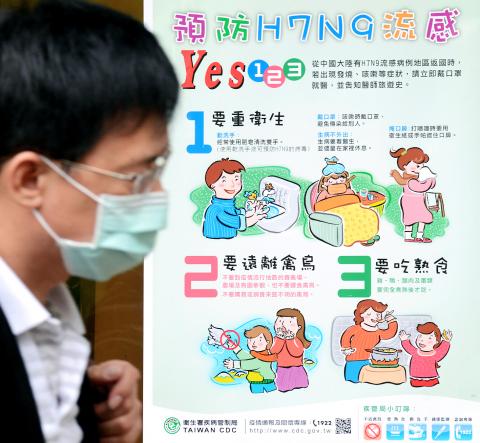A patient with H7N9 avian influenza was in “serious, but stable” condition following treatment, a senior Department of Health official said yesterday.
The patient, a 53-year-old Taiwanese businessman working in China who returned from Shanghai on April 9, was confirmed a day earlier to have been infected with the H7N9 avian flu virus.
“The man remains in serious, but stable condition and is still receiving treatment in a negative pressure quarantine ward at a northern Taiwan medical center,” Centers for Disease Control (CDC) Deputy Director-General Chou Jih-haw (周志浩) said.

Photo: Sam Yeh, AFP
Initial tests showed that three hospital personnel who had developed respiratory symptoms after coming into contact with the patient were not infected with the virus, Chou said.
The patient, who is the first confirmed case imported from China, often travels to Suzhou, Jiangsu Province, one of the affected areas.
The man, who is a hepatitis B carrier and suffers from hypertension, visited Suzhou from March 28 to April 9, Chou said.
“He did not come into contact with poultry during his stay in Suzhou, but fell ill on April 12 with symptoms of fever, sweating and fatigue,” Chou said, adding that the man initially did not show respiratory symptoms, such as coughing and a runny nose.
The man went to see a doctor on April 16 and began taking Tamiflu the same day. However, his condition worsened in the subsequent three days.
“He was transferred to the northern Taiwan medical center on April 20 [last Saturday] and has since been receiving treatment, including intubation,” Chou said.
An investigation showed that 139 people had come into contact with the man in Taiwan, the Central Epidemic Command Center said.
Three of them had close contact, 26 had contact more than seven days ago (putting them past the infectious period) and 110 are hospital personnel, the center said.
CDC Director-General Chang Feng-yee (張峰義) said six laboratories in Taiwan have been recruited by the agency this week to examine specimens of suspected H7N9 avian flu cases.
The remarks were made in response to a suggestion by Democratic Progressive Party Legislator Chao Tien-lin (趙天麟), who said the CDC should let the 30 contracted laboratories in hospitals around the country process the samples, as it did during the SARS outbreak in 2003.
Chang said the nation has nine contracted laboratories, six of which have started sharing the workload of the CDC’s own laboratory.
The CDC uses a PCR (polymerase chain reaction) testing tool to detect the virus, which takes up to 10 hours. Moreover, as a precautionary measure, an additional 10 hours are required for gene sequence detection, Chang said.

Beijing could eventually see a full amphibious invasion of Taiwan as the only "prudent" way to bring about unification, the US Department of Defense said in a newly released annual report to Congress. The Pentagon's "Annual Report to Congress: Military and Security Developments Involving the People's Republic of China 2025," was in many ways similar to last year’s report but reorganized the analysis of the options China has to take over Taiwan. Generally, according to the report, Chinese leaders view the People's Liberation Army's (PLA) capabilities for a Taiwan campaign as improving, but they remain uncertain about its readiness to successfully seize

Taiwan is getting a day off on Christmas for the first time in 25 years. The change comes after opposition parties passed a law earlier this year to add or restore five public holidays, including Constitution Day, which falls on today, Dec. 25. The day marks the 1947 adoption of the constitution of the Republic of China, as the government in Taipei is formally known. Back then the Chinese Nationalist Party (KMT) governed China from Nanjing. When the KMT, now an opposition party in Taiwan, passed the legislation on holidays, it said that they would help “commemorate the history of national development.” That

Taiwan has overtaken South Korea this year in per capita income for the first time in 23 years, IMF data showed. Per capita income is a nation’s GDP divided by the total population, used to compare average wealth levels across countries. Taiwan also beat Japan this year on per capita income, after surpassing it for the first time last year, US magazine Newsweek reported yesterday. Across Asia, Taiwan ranked fourth for per capita income at US$37,827 this year due to sustained economic growth, the report said. In the top three spots were Singapore, Macau and Hong Kong, it said. South

Snow fell on Yushan (Jade Mountain, 玉山) yesterday morning as a continental cold air mass sent temperatures below freezing on Taiwan’s tallest peak, the Central Weather Administration (CWA) said. Snowflakes were seen on Yushan’s north peak from 6:28am to 6:38am, but they did not fully cover the ground and no accumulation was recorded, the CWA said. As of 7:42am, the lowest temperature recorded across Taiwan was minus-5.5°C at Yushan’s Fengkou observatory and minus-4.7°C at the Yushan observatory, CWA data showed. On Hehuanshan (合歡山) in Nantou County, a low of 1.3°C was recorded at 6:39pm, when ice pellets fell at Songsyue Lodge (松雪樓), a